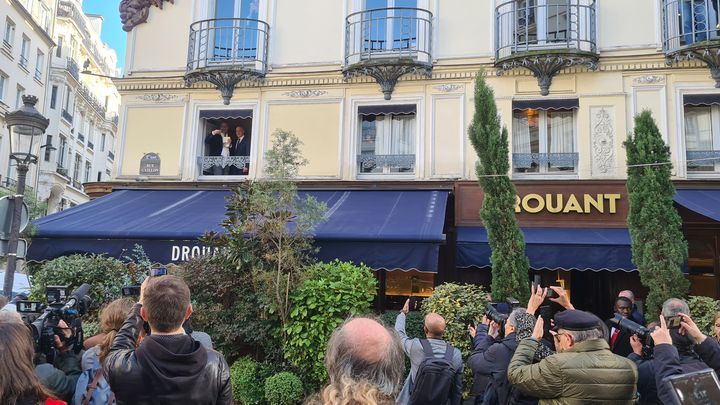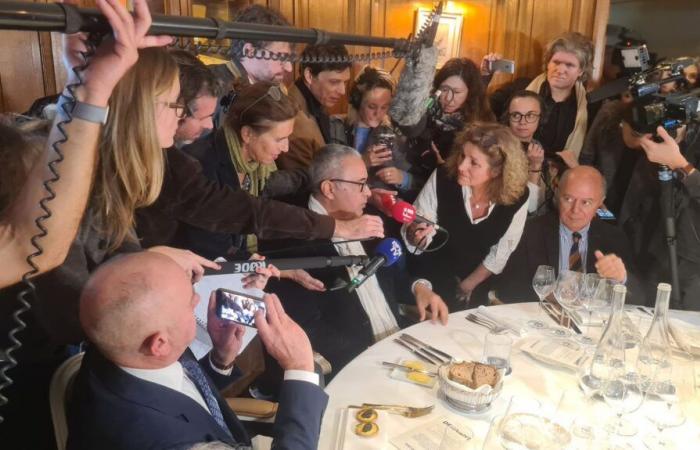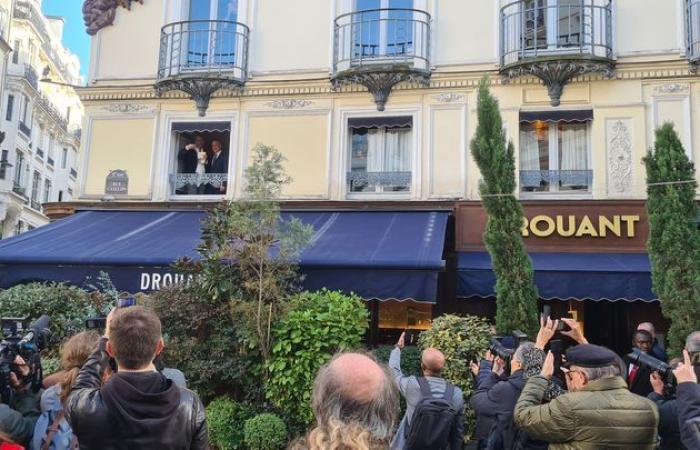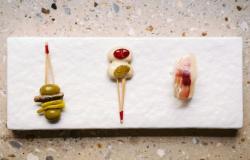Goncourt station, line 11. Calm atmosphere and deserted platforms, just a breath of air. However, it is not at Goncourt station in the 11th arrondissement that the award ceremony of the same name takes place, but a few stops further, in the 2nd arrondissement, near Place Gaillon, near the Opera. It is here, at the Drouant restaurant, that the Goncourt Brothers instituted the biggest raout in French literature.
In front of the facade hidden by yew trees which hide the more than century-old front of the institution, the first satellite dishes, booms and microphones begin to emerge. After several days of gray, a ray of sunshine lights up Paris. Behind the millimeter-trimmed shrubs, Simon, the restaurant's sommelier, appears with a champagne bucket filled with ice cubes, “Drouant” flocked bottles and cheese gougères, ready to delight guests and journalists.
At 11 a.m., the crowd is still thin, even if the first media and curious people trickle in on this chilly Monday morning in November. For the moment, we're talking about everything except the Goncourt because year after year, this year the prize falls on a day of great news, the eve of an American election and the day of the death of the giant of soul Quincy Jones.
Loyal to the post, the regulars are there, like Jean, a former engineer who became an amateur photographer. He doesn't know anyone, but recognizes all the faces at Goncourt: Pierre Assouline, Tahar Ben Jelloun with his red scarf over an orange suit, Françoise Chandernagor, sunglasses screwed onto his nose, Pascal Bruckner or Christine Angot. Jean doesn't miss anyone, at the risk of receiving an icy look from JM Le Clézio, when he wants to take a portrait of him, a member of the Académie Renaudot, which also sits at the famous address. The journalists remain relaxed. Between two discussions on the price of freelance work, they send quick messages to the editorial staff: “As soon as it sends, I swing.” There is still more than an hour of waiting, and the rumor is spreading Daoud? Faye? Faye? Daoud? Around 11:15 a.m., the jury withdraws, the doors of the Salon Goncourt close and will not reopen until an hour later for the announcement of the result.

Around noon, that's it, that's all we talk about. And everyone has their own little comment: “We know that the majority of the jury comes from Gallimard, it will be Daoud.” Favorite of the prize, the name of Kamel Daoud seems to have become clearer for several days and the trend is confirmed a few minutes before the verdict. Although the potential face-to-face with Jacaranda by Gaël Faye promised an exciting literary and media duel, few doubts remained in the cozy lounges of the restaurant where journalists and guests were gathered. We recognize the author of Whirlwind of life you film Jules and Jim, Serge Rezvani, 96 years old, in great shape.
Around 12:40 p.m., the excitement upstairs announced the approach of the verdict. “It voted!” exclaims a journalist whose number of Goncourt prize announcements on the clock is incalculable. President Philippe Claudel descends a few steps, flashes crackle, the forest of poles rises. Paper in hand he speaks briefly and announces the verdict: Kamel Daoud is the new Goncourt prize with his novel Houris.
The 54-year-old author therefore wins against Gaël Faye (Jacaranda) who also received the Renaudot prize, Sandrine Collette (Madelaine before dawn) and Hélène Gaudy (Archipelagos). He thus takes over from Jean-Baptiste Andrea, crowned in 2023 for Watch over her. After the announcement, journalists rush to the first floor. In front of platters of caviar and glasses of fine wines, the ten members of the Academy await the winner. The small restaurant room is full of reporters, impatient to capture the reaction of the winner and the jury.
“It’s first and foremost a literary choice!”, declares Philippe Claudel, president of the jury, in response to the question about the bold choice and the political significance of Kamel Daoud's novel. Indeed, in an unusual gesture, the police station of the 2nd arrondissement had been warned of a possible victory for the Algerian author, for fear of excesses. In his third novel, Kamel Daoud delivers the poignant interior monologue of a young woman, Aube, who became mute after surviving an attempted throat slitting during the “black decade” period of civil war in Algeria, the evocation of which is a taboo in the country.


The author arrives quickly, relaxed and serene alongside Antoine Gallimard, his editor. He addresses the political choice of the Academy with frankness : “I'm not a politician. The fact that an Eastern European writer from the 1970s is awarded an award does not make him an expert on communism.” For him, discussing deprivations of liberty is not a question of politics. He insists that he “don’t challenge anyone” and that “he misses Algeria”emphasizing that a writer comes down to “a table, a chair and a country.”
After responding to the assembled journalists, as tradition dictates, the author appears at the restaurant window, ceremonial book in hand, to greet a moderately large crowd who came to applaud the one who wanted to speak about those who do not speak.








